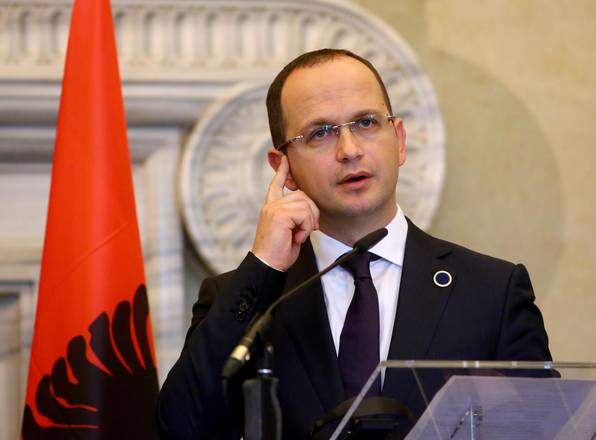Resumption of Tirana-Belgrade relations starts from Rome
Bushati, from trilateral meeting, a relevant political outcome
24 January, 20:07(ANSA) - ROME - Rome, Tirana and Belgrade look to the future.
The first two countries are looking for a strengthening of economic and trade relations, trying to get past the recent incidents and the long-lasting tensions. After yesterday's trilateral meeting among foreign affairs ministers, the two countries overlooking the Adriatic Sea seem much closer to each other. ''There was a relevant political outcome'', Albanian top diplomat Ditmir Bushati said after the meeting promoted and hosted by Italy's Foreign affairs Minister.
Bushati talked with his counterparts Ivica Dacic and Paolo Gentiloni about economy, energy, security, macro Adriatic Ionian region, stabilization of the Balkan region, EU membership. In the background, the usual tensions between the Serbs and the Albanians, including the drone incident during the match between the two national soccer teams, which had become a diplomatic incident. ''The meeting with Minister Dacic - Bushati explained to ANSA New Europe - took place in a very positive atmosphere.
We discussed issues of common interest, trying to look forward, without thinking about the past and identifying new spaces of cooperation. We are grateful to Italy for having fostered this trilateral meeting''.
After the historic visit of Prime Minister Edi Rama in Belgrade last November, now it's the Serbian Prime Minister Aleksandar Vucic's turn to visit the Albanian capital city. ''We can not wait another 68 years before this happens again'', Bushati humorously commented. An improvement in relations between Tirana and Belgrade also depends on Serbian recognition of Kosovo's independence, a subject that was not discussed at all in Rome. Due to the willingness to look to the future. ''I do believe - Bushati said - that working on topics which can involve the whole of the Balkans, such as energy, infrastructure, economy, will gradually enable us to resolve the issue of Kosovo. I know it will take us some time, even years, but also Serbia will come to this conclusion''.
In the bilateral meeting with his Italian counterpart Gentiloni, ''we talked about the economy and energy' '. With Italy, which he defines as a strategic partner in the Balkans, ''we discussed how to strengthen the quality of our economic relations, for example by reducing the fixed fee - which affects all goods coming from Albania -, and Premier Matteo Renzi confirmed Italy's commitment to resolving this problem''. Bushati called for ''the presence of major Italian companies in Albania'', that are still unseen. Another subject under discussion, ''the Trans Adriatic Pipeline'', which is something that Rome is not going to withdraw, despite some difficulties at the local level and the protests of the No Tap San Foca (Melendugno municipality), the village in southern Italy which will be the ultimate destination of the new infrastructure that will bring gas to Europe from the Caspian Sea. ''I am aware of the difficulties in Puglia - Bushati underlined - but Gentiloni reassured me that all problems will be resolved''.
Finally, the threat of terrorism after the events in Paris.
Although Albania is drafting an ''anti jihad'' law to prohibit its citizens from fighting abroad. ''We are working to improve our legislation and increase penalties against the so-called foreign fighters''. Among them, the Albanians, said Bushati, ''represent a small number when compared to those from other European countries. But no one is safe, this is a global threat''. The Balkans, however, have long since been a place where Islamist radicalism is becoming established. ''This does not happen only in our region - the minister remarked - but also in the EU countries. The main difference is that in the Balkans there are no solid democratic institutions.
Therefore, we are more vulnerable than you are in the EU''. Even though in the Balkan region ''there is no war, under the surface, things are much different. And the incidents between Serbia and Albania prove it''.














